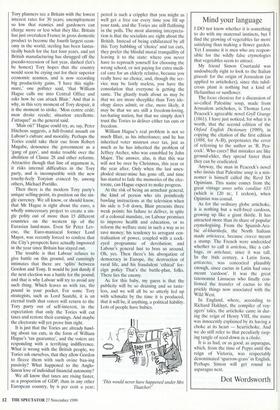Mind your language
I DO not know whether it is something to do with my maternal instincts, but I find the growing of vegetables far more satisfying than making a flower garden. Yet I assume it is men who are respon- sible for the wildly false etymologies that vegetables seem to attract.
My friend Simon Courtauld was undoubtedly right to look to the Italian
girasole for the origin of Jerusalem (as applied to artichokes), since this tubif- erous plant is nothing but a kind of Helianthus or sunflower.
The locus classicus for a discussion of so-called Palestine soup, made from
Jerusalem artichokes, is Thomas Love
Peacock's agreeable novel Giyll Grange (1861). I have just noticed, for what it is
worth, that the second edition of the
Oxford English Dictionary (1989), in copying the citation of the first edition
(1888, for A–B), perpetuates the error of referring to the author as R. Pea- cock'. Who cares? But mistakes are like ground-elder, they spread faster than they can be eradicated.
Anyway, the man in Peacock's novel who insists that Palestine soup is a mis-
nomer is himself called the Revd Dr Opimiam. This name comes from the great vintage anno urbis conditae 633 (which is 120 BC, I reckon), when Opimius was consul.
As for the ordinary globe artichoke, it is nothing but a well-bred cardoon, growing up like a giant thistle. It has attracted more than its share of popular etymologising. From the Spanish-Ara-
bic al-kharshofa, the North Italians made articiocca, because ciocco meant a stump. The French were undecided whether to call it artichou, like a cab- bage, or artichaut, since it was tall. In the 16th century, a Latin form, articactus, was concocted plausibly
enough, since cactus in Latin had once meant 'cardoon'. It was the great taxonomist Linnaeus who finally con- firmed the transfer of cactus to the prickly things now associated with the Wild West.
In England, where, according to Richard Hakluyt, the compiler of voy- agers' tales, the artichoke came in dur- ing the reign of Henry VIII, the name was innocently explained by its having a
choke at its heart — heartichoke. And we do still refer to that peculiarly rasp- ing tangle of seed-down as a choke.
It is as bad, or as good, as asparagus, which, from the time of Pepys until the reign of Victoria, was respectably denominated 'sparrow-grass' in English. Perhaps Simon will get round to asparagus next.
Dot Wordsworth


























































































 Previous page
Previous page